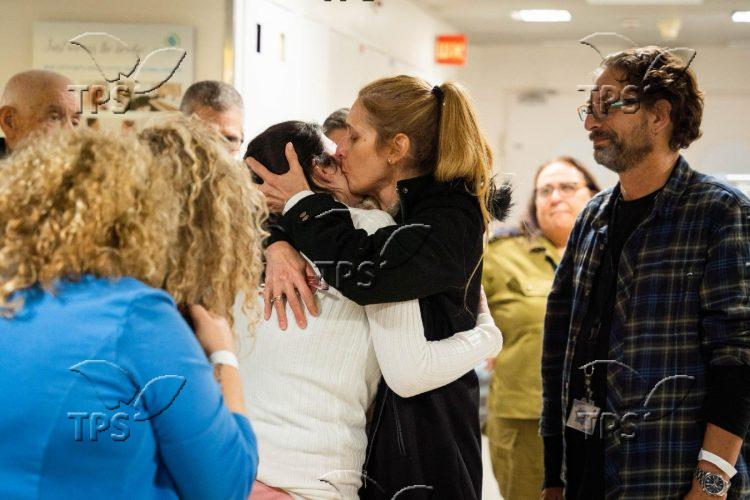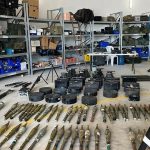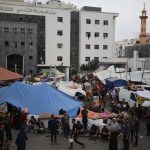‘For Someone Who’s Been a Hostage, It’s Not Easy to Come Back’
Jerusalem, 28 November, 2023 (TPS) -- “I was six years old when I was captured by terrorists during the Entebbe hostage crisis, and Emilia Aloni, who was just released, is the same age. I can’t get her out of my head,” Shay Gross told the Tazpit Press Service.
Aloni, 5, was freed from Hamas captivity on Friday, along with her mother Danielle, as part of the ceasefire agreement between Israel and Hamas.
The Palestinian terror group took captive some 240 people during its Oct. 7 attack on southern Israel, which left 1,200 Israelis dead and thousands more wounded.
Gross was among 246 civilians taken hostage by Popular Front for the Liberation of Palestine (PFLP) terrorists on June 27, 1976, when they hijacked an Air France flight from Tel Aviv to Paris and landed in Entebbe, Uganda.
Gross, who spent a week in captivity, stressed the difficulty of reintegrating into normal life.
“I’m one of the few people capable of understanding what they are going through. For someone who’s been a hostage, it’s not easy to come back,” he said.
Since the ceasefire came into took effect last week, 51 Israelis, all women and children except for one man, have been released, along with 18 foreign nationals.
“We can’t find the words to describe our emotions after 50 challenging and complicated days,” said Tom Hand, the father of Emily Hand, a 9-year old who was among the 13 Israeli hostages freed on Saturday.
“We are overjoyed to embrace Emily again, but at the same time, we remember all the hostages who have yet to return. We will persist in doing everything in our power to bring them back home,” he said.
Gross was freed on June 4, 1976, during “Operation Entebbe,” the infamous Israeli rescue mission during which then-Sayeret Matkal commander Yonatan Netanyahu, Israeli Prime Minister Benjamin Netanyahu’s brother, perished.
“When I was released, I went through a lot,” Gross told TPS. “My mother took care of me. I had trouble sleeping, I couldn’t listen to words in Arabic or voices over megaphones. It lasted for many years.”
Professor Hagai Levine, head of the medical team at the Hostages and Missing Families Forum, echoed Gross’s concern regarding the captives’ physical and emotional status, saying they would likely require a lengthy rehabilitation process.
“The issue at stake is control. They need to take back control over their lives,” Levine told TPS.
“The longer they are in captivity, the longer the recovery takes. That is why it is so urgent for everyone around the world to do everything in their power for us to bring all hostages back now,” he added.
On Monday, Pvt. Ori Megidish, who was captured by Hamas on Oct. 7 and freed by Israeli forces during a raid in the Gaza Strip on Oct. 30, issued her first public message since being rescued.
“Hi, I’m Ori Megidish. I returned home nearly a month ago, and first of all I’m happy to see the moving videos of hostages who are returning to their families. I hope and wish that all the families still waiting for captives reunite with them and experience moments like I did,” she said in a video posted to social media.
“I hope everyone comes back, and they will come back, God willing. I’m okay, and I’m at home with my family, enjoying and I’m happy I got my life back,” she said.
Her story has provided encouragement to the hostages’ families, who have already spoken of negative effects linked to their relatives’ captivity.
Eyal Nouri, nephew of Adina Moshe, who was released on Friday, told Israeli media his aunt “had to adjust to the sunlight” after weeks of darkness in the tunnels under Gaza. Yair Rotem, uncle of Hila Rotem Shoshani, who was freed on Saturday, said his niece was fine, but only communicated in whispers.
Erez Kalderon, 12, and sister Sahar, 16, were released from Hamas captivity on Monday. Their father Ofer, 50, is still in Gaza.
“It’s the first time we’ve smiled since Oct. 7,” Abbey Onn, a cousin of the Kalderons, told TPS. “Relief and joy mixed with sadness and grief. We are still fighting for Ofer and every hostage to come home,” she added.
Tali Amano slammed the Red Cross over its failure to provide hostages with medical care; her 84-year old mother, Elma Avraham, was freed on Sunday and remains hospitalized in critical condition.
Amano said her mother had been “medically neglected” and returned with “a heart rate of 40 [beats per minute] and a body temperature of 28 degrees Celsius, on the verge of losing consciousness and injured all over.”
While Israel holds its collective breath over the prospective return of additional hostages, Gross’s survival story offers hope, including to those who have already come home.
“Rely on your loved ones, be strong and think positive,” he said. “Time will heal you the way it healed me and allowed me to build a family.”
A mental health expert told the Tazpit Press Service in October that returning hostages will be will be dealing with psychological trauma that can lead to “black holes” of memory and even sympathy for their terrorist captors.
It takes time for cognitive abilities and an individual’s frame of mind to get back to normal, so Eiyar Segall doesn’t advise hostages to give media interviews too soon.
“Give them three days,” said Segall, a clinical social worker who spent 20 years as a mental health officer in the Israel Defense Forces.
“When you’re in full survival mode, your cognitive abilities are not with you in full. It takes the brain 48-72 hours to deal with the acute stress reaction to trauma, It takes about three days to set your mind again and start being with your cognitive abilities,” she explained. “It’s not fair to take an interview so immediately after being freed.”







